
SEO.
If you’re a new blogger, I’m sure you’ve heard this term before.
It stands for Search Engine Optimization.
In simplest terms, your blog posts can be the #1 search result on Google (or on another search engine platform) when someone searches for a specific keyword or general term.
For example, here’s the result for Pinterest groups for moms.
Note: any Google searches were done incognito, making the search not related to my browser behavior or history.
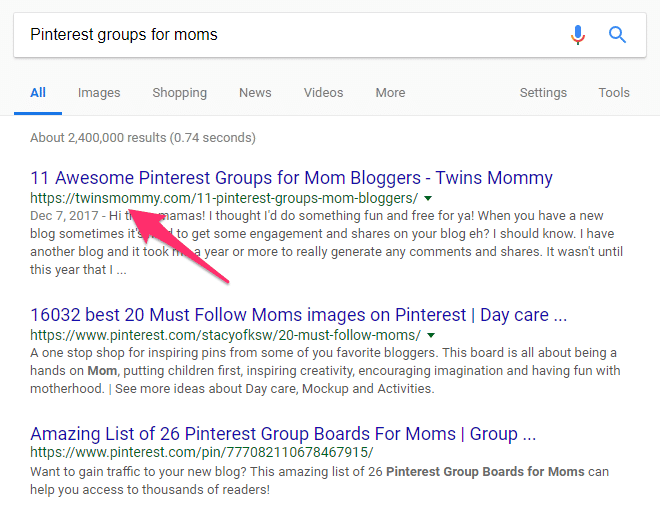
My post is #1 for that search term. The search term – Pinterest groups for moms – is specific.
Let’s search for a more general term – blog tips for moms.
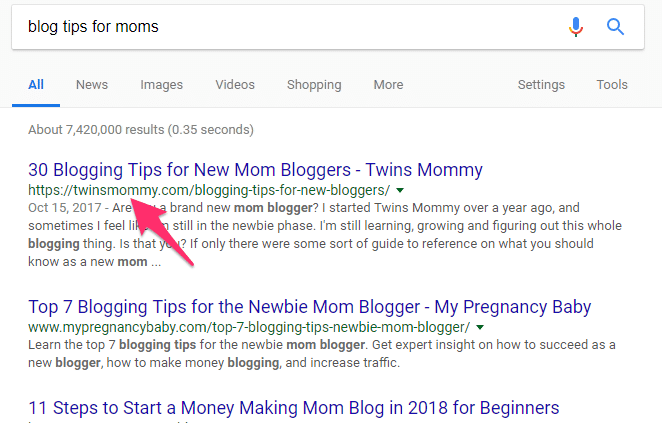
So, you can see, you can rank as #1 or even on page 1 with a specific keyword or a general keyword.
Pro tip: the best keyword to rank for is the shortest type of keyword. Blog tips vs. blogging tips for stay at home moms. As you can see, the base keyword is extremely general but highly searched. But, because it’s general, the traffic may not be targeted and is something to consider in your blog growth strategy. These terms are harder to rank for, but still possible for new bloggers (depending on your niche).
For most new bloggers, however, the way to start ranking on Google is to rank for long tail keywords. These are longer phrases like grow blog traffic for mom bloggers.
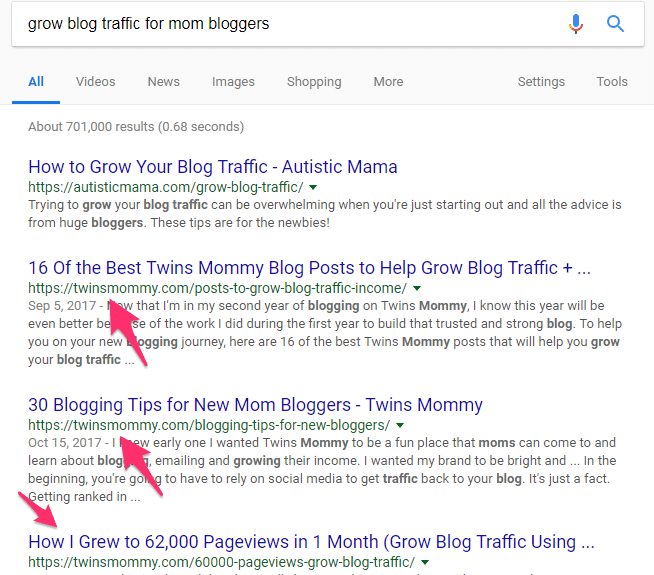
If your blog post has this phrase as well as related words, it has the potential to start ranking.
But, keywords are only one type of metric to SEO.
In my course, Ready Set Blog for Traffic, I teach you the REAL SEO that you need to understand. This is the foundation you need to build your blog on and will help you start ranking once everything is in place.
Google has stated that they favor two factors for ranking:
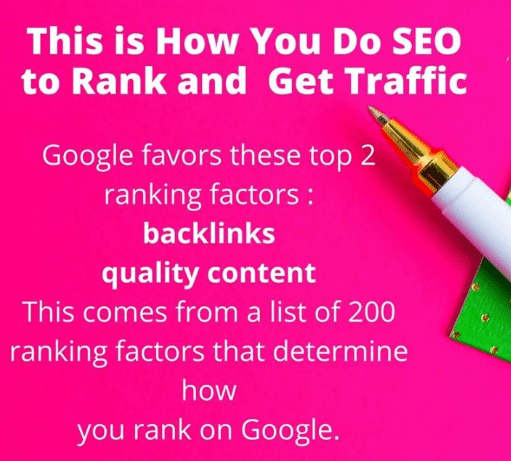
But, for this post, let’s talk about what you – new blogger – can do RIGHT NOW to start the SEO game.
1. Hack for Creating Long-Form Content
Blog traffic in 2018 comes down to creating valuable and long-form content.
Google is looking for the best answer to someone’s search question. If your post is long, it usually means it’s filled with valuable content.
But, as a mom blogger, we are busy! There is no time to pump out a 4k-word blog post. I don’t write 4k-word blog posts every time I post on Twins Mommy. But, I occasionally do, and you should aim for that!
One way is to do a round-up post. These take a long time to write up, but well worth it in the long run. Right now, I’m creating a massive round-up of 100+ mom blogs for Imperfectly Perfect Mama.
This post will be thousands of words long, have links to other blogs and hopefully boost up the shares on Pinterest and Facebook. While most of the posts on Imperfectly Perfect Mama are around 1k words, this long-form blog post will help with growing a readership and showing Google that this blog does have valuable blog posts.
Google is also looking at the other side of the picture – will others link to that mom blogger list on Imperfectly Perfect Mama? If others link to that post as a resource link, then Google will get those signals, and in time this post has the potential to rank in Google (i.e. show up in the search results when someone searches for successful mom blogs or something like that).
Okay, but what if you REALLY ARE SUPER BUSY and can’t spend 10+ hours writing a massive round-up post?
No problem!
Here’s a hack!!
Boost your comments on any of your blog posts.
Are bloggers commenting on your blog?
If yes, then you can create long-form content and boost your comments by:
- Replying to ALL comments
- By writing more than one sentence when you comment

With each comment and response, you can add 50-100 words. And when people see you take the time to reply to comments, they will comment too!
2. Hack for Creating More Keywords
Okay.
Here’s the thing –
For the longest time, I didn’t pay attention to keywords. I wrote blog posts and filled them with keywords naturally. Since I’m a freelance writer, I guess I write in that vein.
For example, when thinking of a headline, I think of something like this:
How to Relieve Pain from Breastfeeding
instead of:
My Story of Breastfeeding My Little Boy
Do you see the difference?
The first headline is optimized for keywords – pain from breastfeeding, relieve pain from breastfeeding – while the second headline has no keywords.
So, when I tell my students and bloggers in my Facebook group that I don’t use keywords (i.e. search for keywords and have a strategy around keywords), I really don’t, but I do have a knack for incorporating keywords in my blog posts 
And this last year I’ve looked more at incorporating better keywords to optimize my blog post even more.
But, here’s what new bloggers can do –
You can start creating more keywords in your blog posts with your comments.
Yes, I’m focussing on your comments because this is a rich resource for creating new content, long-form content and keyword content.
So, you do this by incorporating keywords in your responses to blog comments.
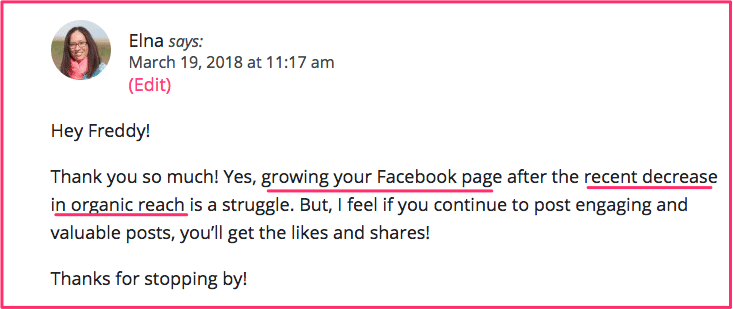
Sometimes, the person leaving the comment will have keywords in it too!
Next time you reply to one of your blog comments, see how you can fit a keyword or two into your response. It can go a long way down the road for ranking in Google.
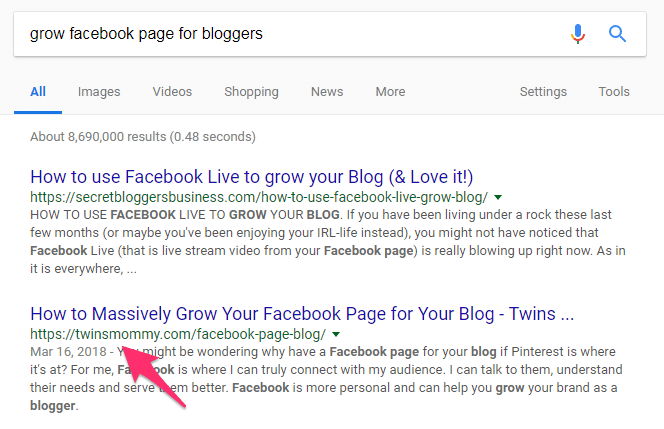
Don’t Be Fooled
From this post, it seems like if you do these two things, you’ll start ranking. This isn’t the case, especially for new bloggers.
SEO starts working about a year into blogging. If you start your blog, create consistent and valuable blog posts, link to good resources and others link to your blog posts, Google will start getting signals that your blog is valuable.
So, you can add these two little hacks into your overall SEO strategy to help you later when Google starts to pay attention to your blog.
Ready Set Blog for Traffic gives you that foundation for the best practices with SEO and any future updates I add to the course will build on that foundation so that all new bloggers have the best outcome to ranking on Google!
Over to you – tell me how long you’ve been blogging and your plan for SEO (if you want to share it!).